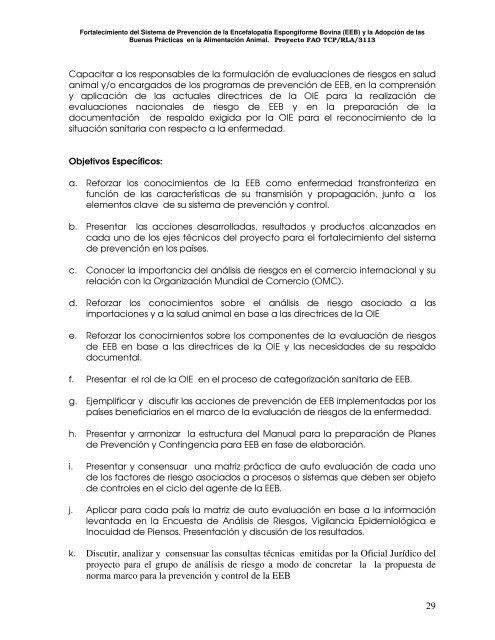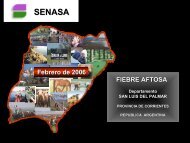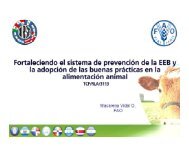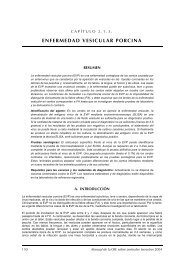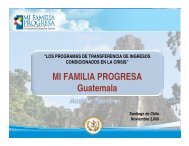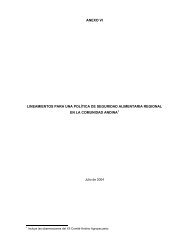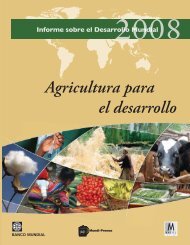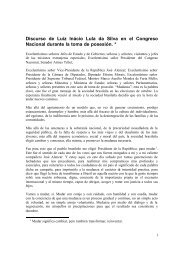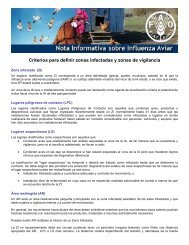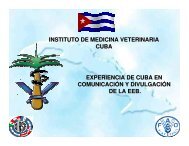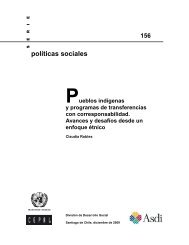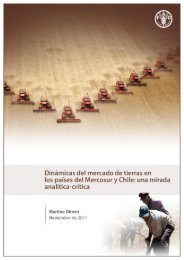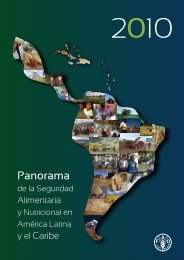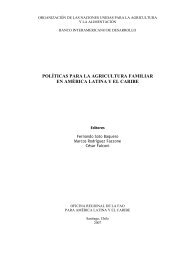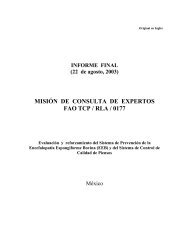documento - Oficina Regional de la FAO para América Latina y el ...
documento - Oficina Regional de la FAO para América Latina y el ...
documento - Oficina Regional de la FAO para América Latina y el ...
Create successful ePaper yourself
Turn your PDF publications into a flip-book with our unique Google optimized e-Paper software.
RECOMMENDATIONSAT EU LEVEL> Integration of learning into the life course must bea priority. The current scale of economic and socialchange in Europe <strong>de</strong>mands a fundamentally newapproach to education and training;> Formal learning (learning taking p<strong>la</strong>ce in educationand training institutions) must continue to be pursuedand adapted to ol<strong>de</strong>r persons needs. However,non formal (taking p<strong>la</strong>ce alongsi<strong>de</strong> formal institutionsbut not necessarily leading to formally recognised<strong>de</strong>gree) and informal learning (a natura<strong>la</strong>ccompaniment to everyday life) must be sufficientlyrecognised and consi<strong>de</strong>red for financing. Plusthese three categories should be viewed as complementary;> Mobilising resources for life long learning, humanresources, good teaching and learning schemes andinvestment in ol<strong>de</strong>r workers (especially ol<strong>de</strong>r womenin re-entering the <strong>la</strong>bour market after a careersbreak), must be a priority at EU lev<strong>el</strong>;> Creating a life long learning p<strong>la</strong>tform involvingMembers States, and European Social NGO’s to findways to exchange good practices for adult educationthrough the life course;AT NATIONAL LEVEL> Need for national governments to realise the socia<strong>la</strong>nd economic benefits of life long learning by <strong>de</strong>v<strong>el</strong>opingpolicies to encourage a constant upgrading ofskills during the life course (working and non workinglife);> I<strong>de</strong>ntify and anticipate the skills and qualificationsnee<strong>de</strong>d; Engage in a dialogue with the community,ol<strong>de</strong>r workers, and ol<strong>de</strong>r peoples NGO’s to assessthe needs of ol<strong>de</strong>r people;> Recognise and validate formal and informal learningcompetencies and qualifications;> Encourage ol<strong>de</strong>r people to take part in life longlearning programmes, inform, support and provi<strong>de</strong>guidance to ol<strong>de</strong>r people;> Mobilise resources, create and implement projectsthat are sustainable in the long run and improvethose which are currently ongoing.AT LOCAL LEVEL> Local governments should evaluate life long learningneeds in the local community;> Dev<strong>el</strong>op courses, with local educational institutionsthat match the needs of ol<strong>de</strong>r people.AT NGO LEVEL> Dev<strong>el</strong>op campaigns that stress the benefits oflearning, that is, not only for the <strong>la</strong>bour market, butalso to foster citizenship and social cohesion;> Create tailor ma<strong>de</strong> courses with the support ofnational and local authorities.AT CITIZEN LEVEL> Encourage the assessment of individual life longlearning needs: for leisure, to create a business, toachieve a personal goal, to upgra<strong>de</strong> a technical skill,to engage in sports activities, to <strong>de</strong>v<strong>el</strong>op creativeskills (art, music, theatre), etc.29


